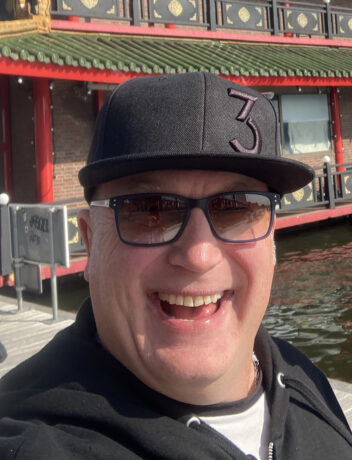
Eric “Shakes” Grzybowski originally wanted to be a hockey player. Growing up in Detroit, Shakes started out as a rapper. While performing regionally, he got a lot of experience that led him to work as a stagehand. He then moved up the ranks from tech to stage managing and on to tour and production managing. He’s worked with a wide array of artists, but for 18 years, he was full time with Kid Rock. Other artists he’s worked for include Korn, KISS, the Reverend Horton Heat, Poison, and more. When we spoke, Shakes was just wrapping up PM duties for the Pantera tour and was moving on working on the Queens of the Stone Age tour.
How did you get into the industry?
I was part of a rap group, the Three Wise Men. We were doing our thing, regionally. Got signed and thought I was going to be a big superstar, but it never happened. I was working at theaters and dealing with local radio stations. Then as a stagehand, I’d meet people, and network. Then meeting Robert Long, Ken “Pooch” Van Druten and others; we clicked years ago. The next thing I know I was out doing working with Warrant and then Reverend Horton Heat. Moving on from there—as drum tech and stage manager; I didn’t know which way I wanted to go. Then I started tour managing. Patrick Whitley took me under his wing, and we did a bunch of things.
My first production manager job was Korn with Patrick. I then went to work with Kid Rock and was there for 18 years. I dabbled with different artists here, filling in there; but I was full time with Kid Rock for 18 years. Then I moved on to working with other artists.
What’s an important trait or quality that’s at the core of being a production manager for touring?
It’s tough sometimes because you’ve got a lot of individuals out there, part of the project, that have different personalities. You’ve got to be like a chameleon, adapt with each one. There’s never a dumb question; I prefer somebody always asking me and then I can figure out how to help them. My whole thing is to measure twice, cut once. Ultimately, you’ve got to make sure everything gels, meshes, and gets along. You don’t want to fly off the handle too quick, too soon.

Were there moments or particular jobs that you think really set you on the course of your career?
I think each one matters all the same. I always say, daily in each gig, you’re learning something new every day. I don’t ever stop learning. I don’t claim to know everything and never will. Just like all these venues that we go to. It’s the same venue that we’ve gone to for years, but it’s new situations, new scenarios daily. Especially with different productions that you’re bringing in, you’ve got a different set of keys that you’re dealing with, and you’ve got to adjust to make them fit and to turn the key.
Do you have a project that really stands out to you in your career as a pinnacle show? Something memorable?
There were so many different… what I call histories. I just can’t pinpoint one that’s better than the other. I’d say this present Pantera tour I’m working on, that was pretty epic—the first shows in 22 years as a band, that was pretty special.
One show that does stand out that was epic and historical for me, was about five years ago. I was touring with a band called Lukas Graham out of Denmark, who was successful and had a big record that year. We did a show in Nuuk, Greenland. It was part of a deal with Air Greenland, so we flew our stuff there because the infrastructure there is thin. We played an indoor sports arena in Nuuk. There’s only 15,000 people in the whole city, and we had 7,000 of them at the concert! Getting to Nuuk was an experience in and of itself up there near the Arctic Circle. It was crazy.
Are there other people that have been key to your success, as a mentor?
There have been many along the way. It sucks, I can’t name everyone, because I don’t want to leave someone out, but I would say a lot of people. Like Nook Schoenfeld and John Featherstone; there’s guys like that that were big parts of mentoring me. I really miss Nook, man. He and I were a big part of the Kid Rock team. Nook was a tough loss.
What do you enjoy most about your career?
It’s been quite a while since I had a regular job. During the pandemic I had to get a real job because the touring stopped for me completely. In addition to touring, my second job was working at Little Caesar’s Arena in Detroit, stagehand for the Pistons and Red Wings, as well as shows there. That all stopped. Back in high school, I had a job working at Sinelli Concrete—the yard guy, the concrete truck driver, whatever it took to get the job done, and I still had my CDL. I ended up driving a concrete truck during the pandemic; that was a real job.
In touring, there’s the satisfaction of our daily routine. Sometimes it’s a grind with the travel, getting up early. You’re the first one in at 7:00 a.m. and then you’re leaving at 2:00 a.m., and then you’ve got a four or five hour bus ride and you do it all over again. But the satisfaction of when I get the call that we’re 100% on deck. I make the call to the tour manager and say, “We’re 100% on deck, standby on house lights, go house lights, roll video.” When the kabuki drops, the lights all hit, that first note plays, and the crowd goes nuts… Unless you witness that or have been part of that, there’s no better feeling. Which doesn’t necessarily translate to a regular job.
Is there a piece of advice you got at the start of your career you still find applicable today?
Measure twice, cut once, really. Try not to do dumb sh*t. Teamwork is key; you can’t do it by yourself.
What advice would you give to someone in the early stage of their career in music or television?
I would give that same advice to them. Keep your head on straight, keep focused. Don’t get scatterbrained. Don’t get complacent; a lot of new people get complacent, they get on a tour, and then they get blinders on. It’s like, “Man, stay hustling. Do what you’ve got to do and if anybody needs the help, you help.” Don’t get complacent, especially new guys coming in and coming up, especially if you don’t have a lot of experience; haven’t really been touring that long. Don’t follow some of the old timers that have blinders on that say, “That’s not your job.” We’re a team and we help each other out, no matter what. You adapt, you overcome, you help. That’s one thing that kills me. You will not be part of my team if you do not help as a team.
What surprised you most about your career path?
At one point I wanted to be a hockey player. Then again, I thought I was going to be a rising rap star and I wanted to be on the stage, playing around the world. Obviously, I had the full dose of reality and had to work for a living. I’ve been fortunate enough thanks to the help of mentors and different people who did take me under their wing, that believed in me. I was able to be fortunate in this business that I love, and I love to do. I’ve been fortunate to be on some great projects. Hopefully everything stays healthy and moving forward I can get a good handful of more years and then ride into the sunset.


